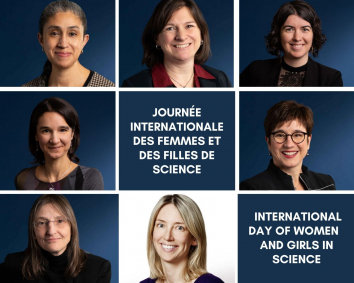On the occasion of the International Day of Women and Girls in Science, the INRS Foundation salutes women researchers’ contribution to crucial issues.
According to the UN, only 33% of researchers worldwide are women. At INRS, women make up 43% of the student body and 25% of the faculty. Their contribution is essential in our scientific and technological community and deserves to be highlighted.
Discover some of the research projects of these inspiring women scientists who are part of our scientific community. The initiatives presented below are part of our INRS Impulse program.
ICEDA • Intersectoral Centre for Endocrine Discruptors Analysis
Professor Valérie Langlois is a specialist in ecotoxicogenomics at the Centre Eau Terre Environnement. Professor Isabelle Plante’s expertise is focused on environmental toxicology at the Centre Armand-Frappier Santé Biotechnologie. Together, they lead ICEDA, a pan-Canadian collaborative project that aims to bring together researchers whose mission is to inform, assist and serve as a resource to government, industry, non-profit organizations and the general public in the identification, recognition, quantification and management of endocrine disruptors.
Healthy dogs for the betterment of all • New molecules for canine herpesvirus
Professor Angela Pearson specializes in molecular virology and viral pathogenesis at the Centre Armand-Frappier Santé Biotechnologie. She proposes to better understand the infection of healthy cells by this virus in order to target the development of antiviral agents to prevent the development of disease in bitches and their puppies. In particular, it is hoped to identify small molecules that inhibit the attachment of the virus to host cells. Ultimately, this research project will serve as a launching pad for research on herpesviruses specific to other animal species, such as domestic cats. Given that the pandemic has created a new infatuation with pets, this project is part of a desire to promote animal health while fostering the well-being of their human companions.
Chair in Sustainable Water Management • Improving municipal water quality to bring rivers back to life
In her laboratories at the Centre Eau Terre Environnement, Sophie Duchesne's work contributes to hydology and urban infrastructure. The overall management of water presents many challenges to Quebec municipalities. In addition to drinking water supply and wastewater collection and treatment services, there are issues related to climate change, demographic development and the need to preserve or even restore natural aquatic environments. His research chair project proposes a concerted and global approach, which will allow the development of tools and methods to improve water management and, ultimately, to transpose the results obtained throughout Quebec, regardless of the size of the municipality and its urban or rural location.
Pôle d’expertise en santé des familles, périnatalité et parentalité • Updating knowledge to adapt available services and resources
Professors Laurence Charton, whose work at the Centre Urbanisation Culture Société focuses on today’s families, and Cathy Vaillancourt, a pregnancy and toxicology specialist at the Centre Armand-Frappier Santé Biotechnologie, are the initiators of a chair project within the framework of the Réseau intersectorel de recherche en santé de l'Université du Québec (RISUQ). With other researchers, they propose to promote the well-being and health of mothers, children and parents, with a special focus on people in precarious and vulnerable situations. Their interdisciplinary approach and its territory-wide scope, which engages citizens, partners and decision-makers, give this initiative a distinctive and transformational reach.
In the footsteps of Armand-Frappier • Understanding the protection of the BCG vaccine against tuberculosis and other diseases
Researcher Marie-Claude Rousseau is a professor of epidemiology, and a specialist in inflammatory and autoimmune diseases at the Centre Armand-Frappier Santé Biotechnologie. She proposes to enhance the information contained in the Quebec BCG Vaccination Registry by processing the 4.2 million immunization and bacillus test records so that their data can be queried and cross-referenced with other registries, such as the Registry of Mandatory Reporting Diseases. Her work will help inform decisions about the use of BCG and the development of new TB vaccines, and open up new avenues of research into the protective effect of BCG against other diseases.
Bravo and thank you all!

